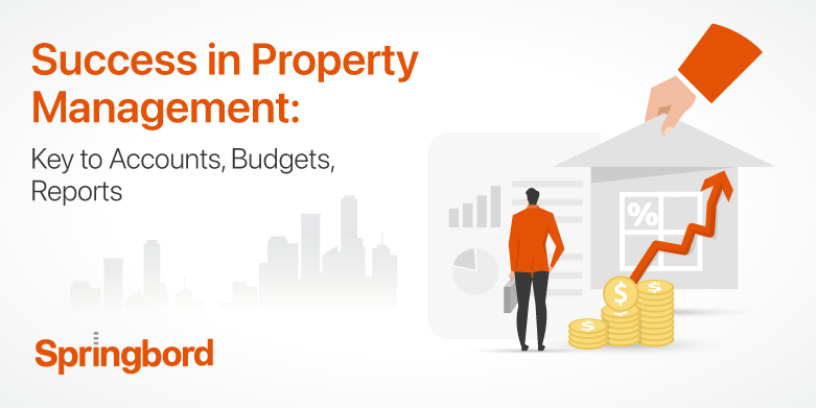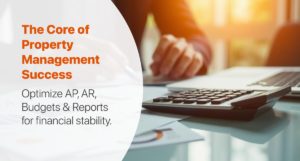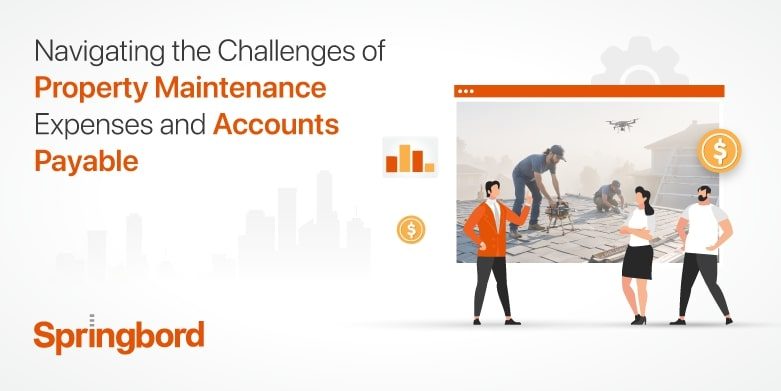 Read time 7 min
Read time 7 minProperty management is a challenging industry that demands careful attention to several crucial financial factors to succeed. These include careful budgeting, accurate financial report generation, and the management of Accounts Payable (AP) and Accounts Receivable (AR). These elements serve as the foundation for effective property management, guaranteeing both long-term growth and financial stability. Let’s look into how each component plays an important role in the stability and growth of property management.
To assist property managers in these crucial areas, Springbord makes use of its vast experience in data management. Our finance and accounting services are designed to optimise these processes, enhancing efficiency and reducing overhead.
Interested in optimizing your financial management? Contact us at Springbord today or visit our website to learn more about how we can support your property management success!

Accounts Payable (AP)
An essential part of property management is accounts payable (AP), which handles the handling of outstanding payments to suppliers and vendors for products and services received. Maintaining strong vendor relationships and making sure that financial obligations are fulfilled on time depend on effective accounts payable management. Here’s how property managers can excel in managing their AP:
- Organised Record-Keeping: It is essential to keep a thorough and organised record of all invoices, receipts, and payment dates. This systematic method streamlines the financial operations of property management by preventing late payments and lowering the possibility of disputes.
- Payment Automation: Implementing an automated payment system is a transformative step for AP processes. Automation reduces manual errors and saves time by streamlining approval workflows and payment execution. This ensures payments are made promptly and accurately, which is essential for maintaining good vendor relations and capturing early payment discounts.
- Budget Integration: Integrating AP with your overall financial planning ensures that payments are accounted for in the budget, preventing overspending and helping maintain a balanced cash flow. This alignment supports strategic financial management by ensuring that expenditures are planned and tracked within the company’s financial framework.
At Springbord, we leverage our expertise in data management and process automation to enhance the efficiency and accuracy of AP operations. Our tailored solutions help property managers maintain excellent vendor relationships through reliable and timely payments, aligned with comprehensive financial oversight.
Accounts Receivable (AR)
Accounts Receivable (AR) management is crucial for property managers to ensure consistent cash flow and optimize revenue collection. For property management, the following are enhanced approaches to successful AR management:
- Timely Invoicing and Clear Terms: Immediate invoicing post-service delivery establishes a professional tone and sets clear expectations. Explicitly outlining payment terms, due dates, and potential late fees in the rental agreements can mitigate payment delays and disputes. Ensuring that invoices are detailed and accurate can prevent confusion and help in faster resolution of any disputes that may arise.
- Proactive Communication: Maintaining open lines of communication with tenants is essential. This involves informing tenants about their billing details proactively and providing a consistent and reliable channel for addressing their concerns swiftly. This approach not only fosters trust but also reduces misunderstandings and potential payment delays.
- Structured Collection Process: Implementing a well-defined collection process is crucial. This should include sending gentle payment reminders before the due date, followed by more direct reminders if the payment becomes overdue. If required, outline the steps and legal actions that will be taken for late accounts. Having a clear policy on credit and collections that is communicated during tenant onboarding can provide leverage in managing overdue payments.
- Flexible Payment Options: Offering multiple payment methods can enhance tenant convenience and satisfaction, potentially reducing late payments. Options could include online payments, direct bank transfers, or even mobile payment platforms. Additionally, providing incentives for early payments, such as small discounts, can encourage tenants to settle their bills promptly.
- Leverage Technology: Automating the invoicing and payment collection process can significantly reduce administrative burden and improve efficiency. AR automation tools can handle repetitive tasks like sending out invoices and payment reminders, freeing up your time to focus on more strategic aspects of property management.
Property managers can improve tenant relations, expedite their AR procedures, and keep a stable financial position by incorporating these practices. At Springbord, we recognize the value of efficient AR management and provide our clients with solutions that take these best practices into account to ensure they get the best possible financial results.
Budgets
The foundation of ethical property management is budgeting. When it comes to scheduling expenses, assigning resources, and making wise financial decisions, budgeting is crucial in property management. Creating and maintaining budgets can be done effectively with the following approach:
- Expense Categorization: Divide expenses into fixed categories like property taxes and insurance, and variable categories such as maintenance and repairs. This helps in better allocation and management of funds, ensuring that you can cover both predictable and fluctuating costs throughout the year.
- Contingency Planning: It is a good idea to set aside money in your budget for unanticipated costs or job openings. This fund serves as a financial safety net, preserving your property management company’s operational integrity even in the event of unforeseen financial difficulties.
- Regular Review: Continuously monitor and adjust your budget to reflect actual expenses and income. This dynamic approach allows you to adapt to changing market conditions and financial realities, ensuring that your budget remains a reliable tool for financial planning. Regular reviews can also help in refining future budgets based on past expenditure patterns and income fluctuations.
- Use Data for Projections: Utilize past data and current market trends to make informed projections about potential income and expenditures. This includes considering future rent increases, possible fee adjustments, and expected changes in occupancy rates.
- Benchmark and Adjust: Compare your operating expenses against industry standards or similar properties to identify cost-saving opportunities or areas where expenditures may be optimized. This benchmarking can guide you in making informed decisions that enhance the property’s profitability and operational efficiency.

Property managers can develop budgets that not only represent the financial goals of their properties but also offer a strong foundation for attaining both operational and financial success by putting these strategies into practice. The value of thorough and flexible budgeting in property management is something we at Springbord are aware of. Our services are intended to support you in efficiently handling these financial responsibilities so that your real estate business can continue to be profitable.
Financial Reports
For property managers, financial reports are essential resources since they offer a transparent picture of a property’s financial situation and help with strategic decision-making. Here’s an overview of the essential financial reports for effective property management:
- Income Statement: This report is crucial for tracking the profitability of a property over a specific period. It details revenue sources and expenses, helping managers understand the financial performance and operational outcomes. By comparing income and expenditure, property managers can identify areas for cost reduction and enhance revenue streams.
- Balance Sheet: The balance sheet offers a complete overview of the property’s financial stability at any given time. It lists assets, liabilities, and equity, which collectively provide insights into the financial strength of the property. This report is vital for assessing the property’s capability to meet its financial obligations and for strategic financial planning.
- Cash Flow Statement: This report outlines the inflows and outflows of cash, highlighting the property’s liquidity and its ability to maintain cash on hand for day-to-day operations. It helps property managers evaluate the property’s efficiency at generating cash to meet debts, reinvest in the property, and manage operating expenses effectively.
For property managers, consistently generating and analyzing these reports can reveal financial trends and potential issues, guiding proactive management and strategic adjustments. These financial statements are foundational for driving operational decisions, forecasting financial performance, and ensuring the property remains financially healthy and competitive in the market.
Conclusion
Effective property management relies on proficient handling of Accounts Payable, Accounts Receivable, budgeting, and financial reporting. Mastery of these financial domains enables property managers to maintain financial stability, optimize revenue, and make strategic decisions for long-term success. Adopting best practices in these areas allows managers to navigate the industry’s complexities with confidence.
Ready to elevate your property management experience? Contact Springbord today to discover how our expert financial management services can streamline your operations and drive your success. Don’t wait—let us handle the details while you focus on what you do best!
With our comprehensive financial management services, you can focus on strategic growth while we ensure your financial operations are streamlined and efficient. Let us help you optimize your Accounts Payable, Accounts Receivable, budgeting processes, and financial reporting.
FAQ
1. What role does Accounts Payable (AP) play in property management?
AP helps track and pay money owed to vendors on time. This keeps suppliers happy and helps avoid late fees or missed payments.
2. How can property managers improve their Accounts Receivable (AR) process?
They can send invoices quickly and clearly explain payment terms. Offering flexible payment options and reminders also helps collect money on time.
3. Why are financial reports important in property management?
Reports show how much money is coming in and going out. They help managers make smart decisions and plan for the future.
4. What is property management accounting?
It is the process of handling all money matters for rental properties. This includes rent collection, bill payments, budgeting, and reports.
5. How often should I review my property management budget?
It’s best to check your budget every month or at least every few months. This helps you stay on track and make changes if needed.
6. Can technology help streamline property management financial tasks?
Yes, using software can save time and reduce mistakes. It automates billing, payments, and reminders.
7. How does outsourcing financial services benefit property managers?
It saves time and ensures accuracy in managing property finances. Experts handle the details, so you can focus on growing your business.







